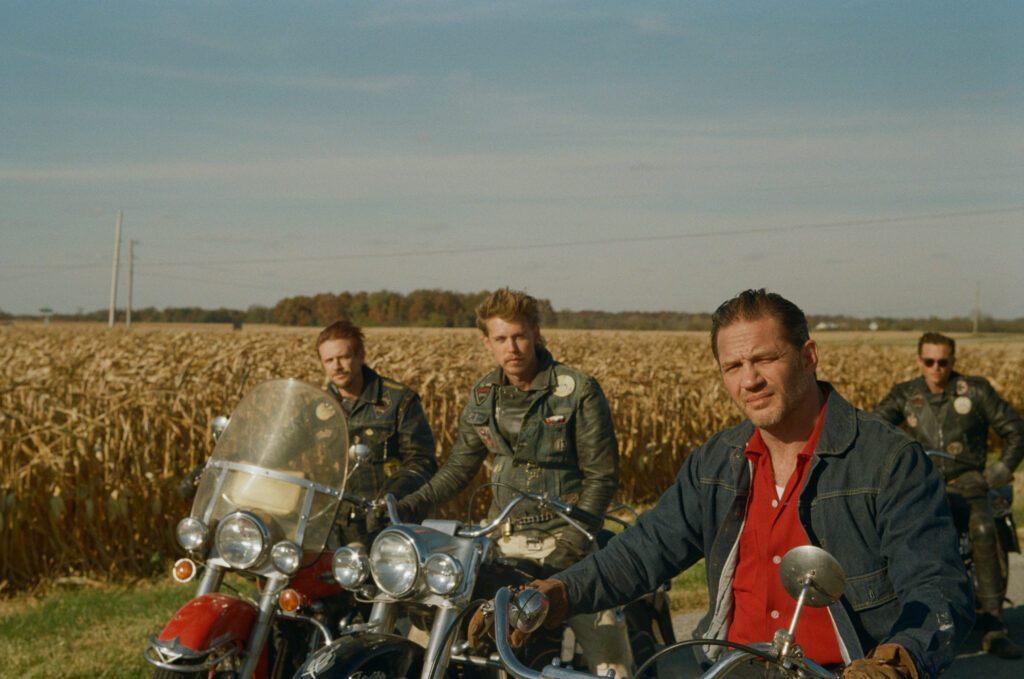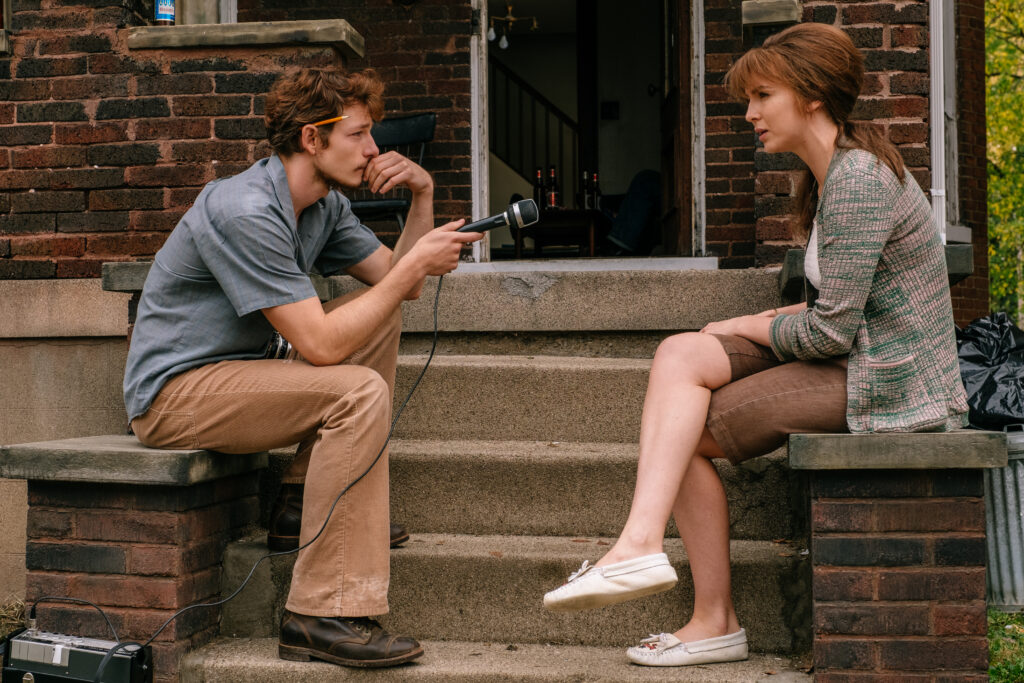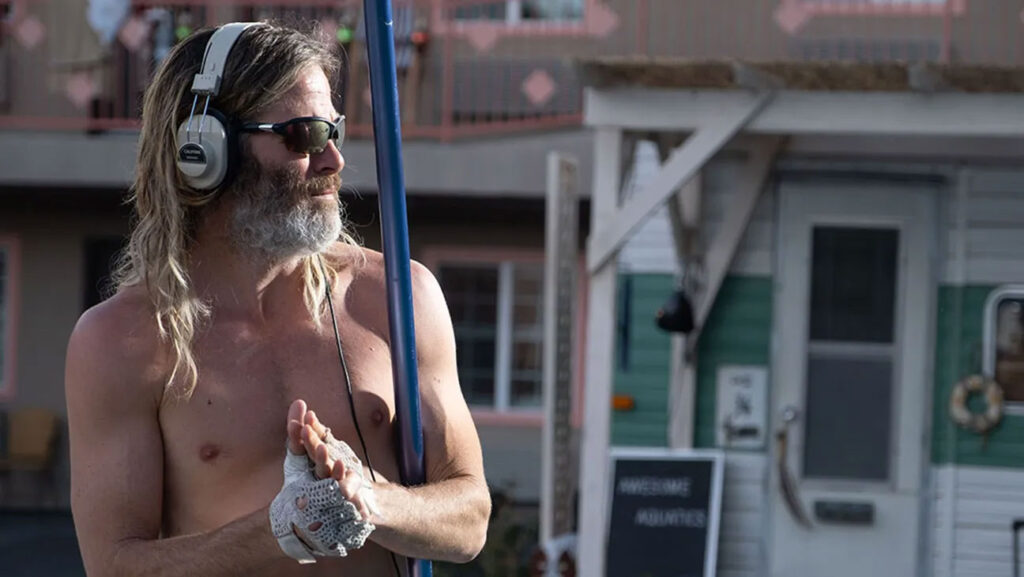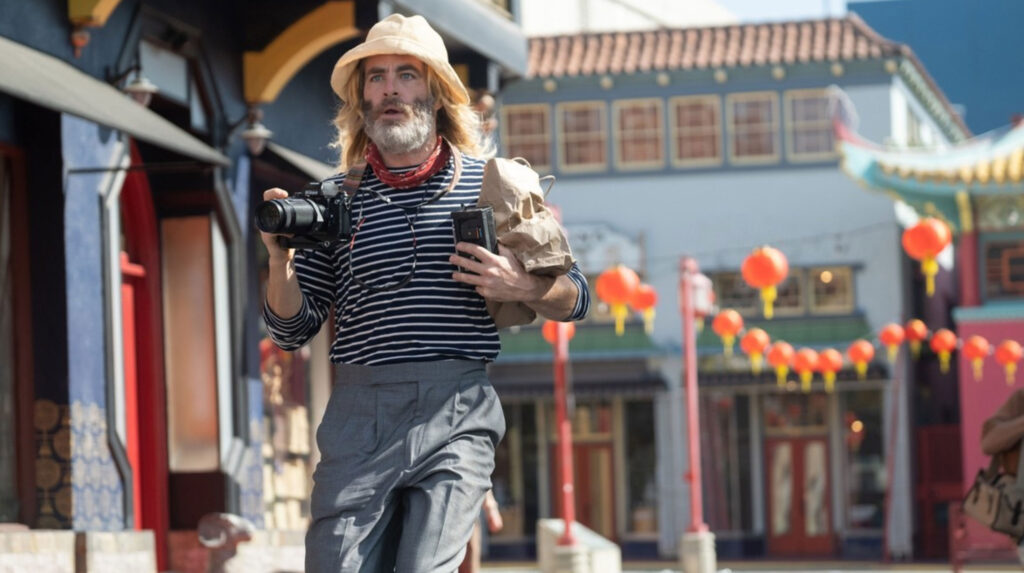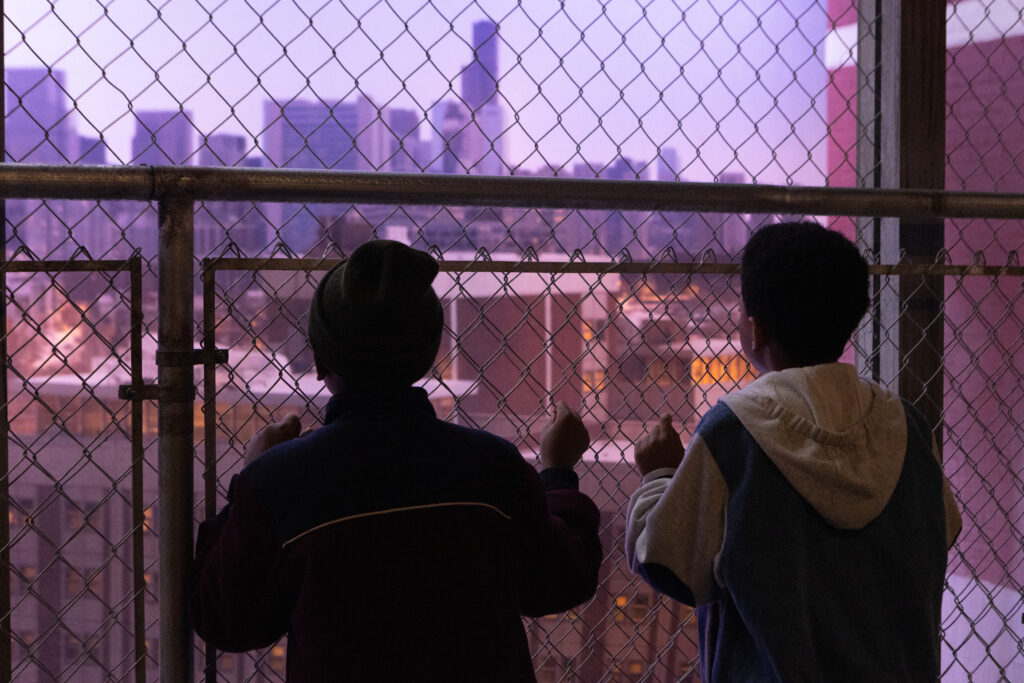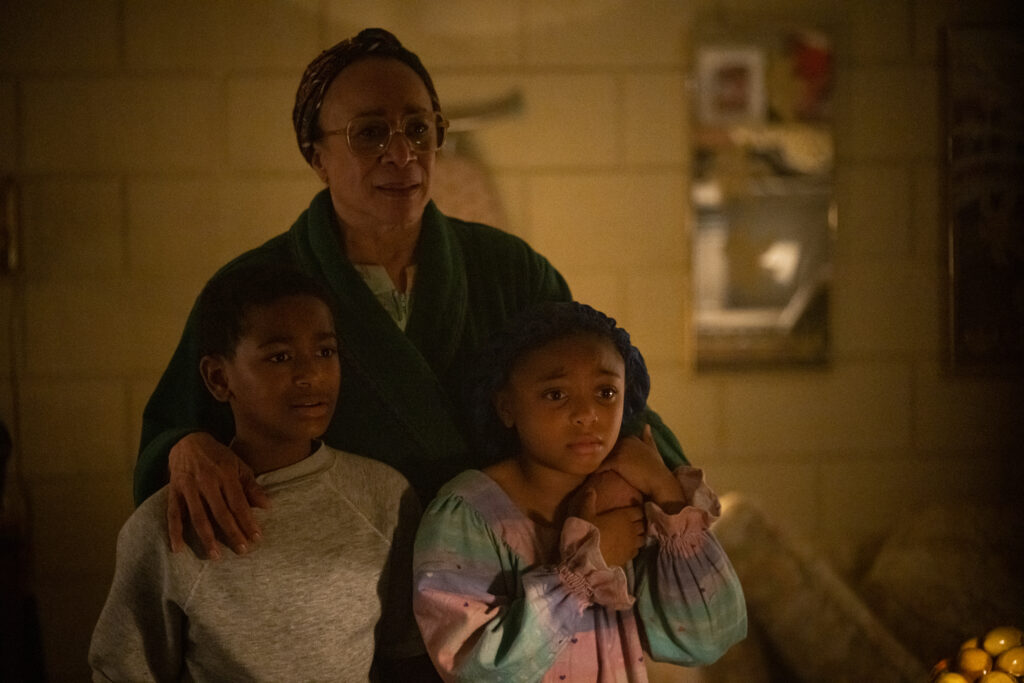July 22, 2024
by Carla Hay

Directed by Cara Mones and Caroline Suh
Culture Representation: The documentary “Sorry/Not Sorry” features a predominantly white group of people (with one African American and one Latina) discussing the #MeToo scandal of comedian/actor Louis C.K. and how it speaks to larger issues of what “cancel culture” really means.
Culture Clash: Louis C.K. had his career temporarily derailed, after he admitted in 2017 that a New York Times report was true about him sexually harassing women for decades; his comeback attempts after his #MeToo scandal have gotten mixed responses.
Culture Audience: “Sorry/Not Sorry” will appeal primarily to people who are interested in watching a documentary about what “cancel culture” really means when a famous entertainer had a #MeToo scandal was able to make a semi-comeback.

“Sorry/Not Sorry” needed more information about people who helped Louis C.K. make a comeback after his #MeToo scandal. The documentary still capably explores difficult questions about the difference between forgiving and enabling admitted sexual harassers. The situation with comedian/actor Louis C.K. is complicated by people’s varying definitions of what type of scandal they think should ruin someone’s career and for how long.
Directed by Cara Mones and Caroline Suh, “Sorry/Not Sorry” had its world premiere at the 2023 Toronto International Film Festival. The documentary is produced in part by The New York Times and is based on the 2017 reporting on Louis C.K. by New York Times investigative journalists Melena Ryzik, Cara Buckley and Jodi Kantor, who are all interviewed in the documentary. In November 2017, the trio broke the story about Louis C.K. being a serial sexual harasser, with his known harassment going back to the 1990s. An epilogue caption in “Sorry/Not Sorry” says that Louis C.K. did not respond to requests for comment or to participate in this documentary.
Lous C.K.’s targets were women (usually other comedians with less power and less fame), whom he would masturbate in front of and/or tell graphic details about his sex life or sexual thoughts, often without their consent. In cases where he did get consent to masturbate in front of a victim, she later reported that she was either in shock or thought he was joking when she said yes. These stories about Louis C.K. had been circulating for years and had been an “open secret” in the entertainment industry, but he had publicly denied or refused to address these allegations in interviews. It wasn’t until the day after The New York Times published its November 2017 exposé on Louis C.K. (with several of his victims going on the record) that Louis C.K. publicly admitted that the reported sexual harassment stories about him were true.
Louis C.K. (whose birth name is Louis Alfred Székely) was born in 1967, in Washington, D.C., although for the first seven years of his life, he was raised in Mexico. He father Luis Szekely
was of Mexican Jewish heritage, while his mother Mary Louise Davis was Irish American. Louis C.K. rarely talks about his Latin/Hispanic ethnicity and the fact that he spoke only Spanish until he was 7 years old, when his family moved back to the United States (in the Boston area), and he learned English. Louis C.K. identifies as a white American and lets people assume that he is fully white.
The racial issue is important because several people in “Sorry/Not Sorry” say directly or indirectly that Louis C.K.’s white male privilege has allowed him to get away with more and make a career comeback faster than someone in the same circumstance who isn’t a white male. The business of stand-up comedy—where Louis C.K. first rose to fame and which was the first part of the entertainment industry where he made his comeback—is also dominated by white men, the demographic that makes the most money from stand-up comedy.
Sex and masturbation have been frequent topics in Louis C.K.’s stand-up comedy routines, where he usually has smirking commentary about how terrible men are to women. Louis C.K. would become even more famous as an actor—most notably, starring in and executive producing his own FX comedy series “Louie,” which was on the air from 2010 to 2015. He has also won several major industry awards, including Primetime Emmys for his screenwriting and Grammys for his comedy albums. In his personal life (which he often talks about his in stand-up comedy act), Louis C.K. was married to artist Alix Bailey from 1995 to 2008, the year that they were officially divorced. He and Bailey have two daughters together.
The fallout of Louis C.K.’s #MeToo scandal was swift and severe. He was fired from the FX comedy/drama series “Better Things,” which he co-created with “Better Things” star Pamela Adlon. The show was later cancelled in 2022. He had a lucrative deal with Netflix that was also cancelled in 2017.
Also resulting from the scandal, Louis C.K.’s comedy/drama movie “I Love You, Daddy,” which he wrote and directed, had its 2017 release cancelled. In “I Love You, Daddy,” C.K. starred as the father of a teenager (played by Chloe Grace Moretz), who is the target of a sexual predator in his 60s (played by John Malkovich), but it’s all played for laughs. There are also scenes in the movie where men pretend to masturbate in front of women.
“Sorry/Not Sorry” features interviews with two women who say that they were the targets of Louis C.K.’s sexual harassment: TV writer/producer Jen Kirkman and artist/comedian Abby Schachner. Both women talk about how they were initially reluctant to go public with their stories because Louis C.K.’s sexual harassment was known and accepted by numerous people in the entertainment industry.
Kirkman describes sexual harassment encounters with Louis C.K., who worked with her in 2002 as a voice actor on the animated comedy series “Home Movies.” She remembers sharing a car ride with him during a “Home Movie” business trip to Massachusetts in 2002, and he began telling her about his sex life without her consent.
Kirkman says she later she turned down his offer to be his opening act in Florida (even though she says she really needed the money) because she instinctively felt it would lead to more sexual harassment from him. On a separate occasion, when she saw Louis C.K. again, he grabbed her by the neck in a private moment and whispered, “We’re going to fuck one day.”
After a Gawker article in 2015 began dropping hints that Louis C.K. was a serial harasser, Kirkman decided to semi-out him on her podcast by describing her own sexual harassment experience with Louis C.K. but without naming him. People figured out anyway that she was talking about Louis C.K., and Kirkman says she wasn’t prepared for the backlash. She was also disheartened by how many people knew about Louis C.K. being problematic but did not publicly support her.
“It was like being thrown into war with no battle training,” Kirkman comments. In the documentary, Kirkland says that Louis C.K. personally contacted her during this time to make amends, but he refused her request to make a joint statement where he would publicly admit to his wrongdoing. Kirkland remembers that Louis C.K. would not say that what happened to her was an isolated incident or that he would stop sexually harassing other women.
Kirkland admits her ambivalence about publicly naming Louis C.K. as her sexual harasser caused her to publicly deny at one point that he was her harasser because she was tired of the bullying and hate that she was getting from his supporters. She also says that she wanted the negative media attention on her to stop. Kirkland mentions that she chose not to be interviewed for the New York Times’ 2017 coverage of Louis C.K.’s sexual harassment because he did not masturbate in front of her, and she feels her experiences with Louis C.K. weren’t as heinous in comparison to the victims who were subjected to watching him masturbate.
In the documentary, Kirkland reflects on her negative experiences with Louis C.K.: “I don’t know if I was traumatized by what he did. I was disturbed. As the years went on, and I had more of a sense of self, I was like, ‘Oh my God. That is so fucked up.’ And this culture of people who think it’s normal—they’re fucked up.”
Schachner (who got masturbation sexual harassment from Louis C.K. in 2003, during a phone conversation) hasn’t given up on wanting to be a full-time entertainer, but she says she was traumatized enough by her Louis C.K. experiences, she took a few breaks from the entertainment industry and did some “hiding.” Schachner says at the time, she was afraid of retaliation if she went public about Louis C.K. being a sexual harasser.
Schachner says that in the private phone conversation that she had with Louis C.K., she thought that they were going to discuss business, but he ended up sexually harassing her. “I felt duped,” Schachner says. She also mentions in her documentary interview that she never consented to Louis C.K. masturbating in front of her. Schachner also says that Louis C.K. tried to reconcile with her in 2009, when he reached out to her for an in-person meeting at Canter’s Deli in Los Angeles. She agreed to the meeting but didn’t get complete closure because he wouldn’t say that he had stopped his sexual harassment.
Comedian/writer Megan Koester said she heard stories about Louis C.K. masturbating in front of women as sexual harassment, but she was still surprised by how far people were willing to go to cover it up. In 2015, after Bill Cosby’s career was torpedoed when numerous women came forward accusing him of drugging and raping them, Koester says she was at the Just for Laughs Comedy Festival as a reporter for Gawker. Koester asked people at a Just for Laughs event what they thought of the allegations against Cosby and the sexual harassment stories about Louis C.K.
According to Koester, Just for Laughs executive Bruce Hills (who was the chief operating officer of Just for Laughs in 2015 and has since been promoted to president of Just for Laughs) yelled at her to stop asking those questions about Louis C.K. because Hills said that Koester was on the turf of Just for Laughs, and Louis C.K. is a friend of the festival. Koester says that this intimidation rattled her. In the documentary, Koester says that she was so disgusted by seeing how Louis C.K. was coddled and celebrated in the entertainment industry by people who knew he was sexual harasser, she ended up quitting her pursuit to be a full-time entertainer. Koester says she now sells items on eBay for her income.
One of the main criticisms that Louis C.K. accusers get is that they are jealous of him and his career. It’s victim blaming that unfairly ignores that Louis C.K. has admitted to the harassment that has been reported about him. Victims who didn’t report the harassment right away are also blamed, as if what happened to them couldn’t possibly be true because they kept it private for a long time—even though the perpetrator admitted it happened.
The documentary mentions Dave Chappelle (who has also gotten much criticism for being misogynistic and transphobic in his work) as one of the celebrities who’ve publicly supported and excused Louis C.K. for the sexual harassment. Louis C.K.’s supporters usually argue some version of this comment: “What Louis C.K. did is not that bad compared to someone like convicted rapist Harvey Weinstein.” However, it’s a flawed argument because sexual harassment is sexual harassment, whether someone gets into legal trouble for it or not.
Also interviewed in “Sorry/Not Sorry” are two people who employed Louis C.K. at different times and have very different perspectives. Michael Schur, co-creator of the comedy series “Parks and Recreation,” hired Louis C.K. as a guest star for six “Parks and Recreation” episodes in 2009. Schur said he heard the sexual harassment stories about Louis C.K. at the time but he ignored them because he thought, “It’s not my problem.” Schur says he now regrets this dismissive attitude and should’ve been thinking more of the people being hurt by this sexual harassment.
Noam Dworman, owner of the Comedy Cellar nightclub in New York City, was the first person to hire Louis C.K. for a stand-up comedy show after Louis C.K.’s #MeToo scandal derailed the comedian’s career in November 2017. Louis C.K. returned to the spotlight by doing an unannounced appearance at the Comedy Cellar in August 2018, which led to Louis C.K. doing subsequent Comedy Cellar appearances that were announced. Dworman and the Comedy Cellar got a lot of public criticism and backlash for the decision to give Louis C.K. these comeback opportunities. However, Dworman and the Comedy Cellar received a lot of praise from people who say they dislike “cancel culture” and think Louis C.K. deserves a chance to resume his career.
Dworman is defensive of this decision and thinks, as the owner of a private business, he has a right to decide to book performers whom audiences want to see. Dworman comments in the documentary: “You can feel however you want to feel about these things, but to feel you have the right to impose on a private business who’s employing a free person, who’s performing in front of people who want to see him in a free country, [and] that you feel that this is your business, I think that’s very, very dangerous. And that is where I’m drawing my line.”
Also interviewed in the documentary are comedians Michael Ian Black, Aida Rodriguez and Andy Kindler. Several journalists/critics are also interviewed, including Alison Herman of Variety, Wesley Morris of The New York Times, and Jesse David Fox of Vulture, and freelancer Sean L. McCarthy, whose specialty is comedy journalism. Most of the journalists say that Louis C.K. cleverly hid his predatory ways in plain sight by making his crude sex talk and “men are pigs” jokes as part of his comedy persona.
In 2018, Black got backlash for posting a message on Twitter saying he was excited to see what Louis C.K. was going to do next and questioned how much longer the disgraced comedian deserved to be shunned because of the scandal. Black later made a public apology and says he learned that he should have been more sensitive to the people hurt by Louis C.K.’s sexual harassment.
In the documentary, Black comments: “Louis had a whole bit [in his stand-up comedy act] about how the greatest threat to women is men. Louis can still do that bit and say, ‘I was one of those guys. And let me talk about it’ And it feels like such a missed opportunity that he didn’t do it.” Instead, Louis C.K. has addressed the issue in his stand-up act by joking that if anyone asks permission to masturbate in front of an acquaintance, they shouldn’t do it, even if that person says yes.
The documentary also has some brief interview clips with a few unidentified Louis C.K. fans (all of them are men under the age of 40) who were interviewed at one of his post-scandal concerts. One of the men says of his support of Louis C.K., who has been called a hypocrite by many critics: “Everyone lives with a certain amount of hypocrisy. This is the amount I’ve allocated for myself.”
Has Louis C.K. learned from his misdeeds and stopped being a sexual harasser? Did he ever get professional counseling for this sexual harassment addiction that he has publicly admitted to having? Did he spend time meeting with any victim rights groups to learn and make amends? Louis C.K. isn’t saying if he’s done any of those things, but at the time this documentary was released, there hadn’t been any complaints about him sexually harassing anyone since his #MeToo scandal in 2017.
Kirkman says, “I have never asked anyone to denounce him so he wouldn’t work.” However, she comments that a major problem is how predators who are famous are often excused and rewarded while their less-famous victims are often blamed and blackballed. “Everyone letting all of these predators back, while some people never had a chance, it really hurts,” Kirman says, “especially in this culture where it seems like nobody cares.”
Although “Sorry/Not Sorry” does a very good job of giving background information (much of it already covered in The New York Times and other media outlets) and assembling archival footage, what’s missing from the documentary is a better examination of the culture and the people who allowed Louis C.K. to make a comeback. Louis C.K. hasn’t been able to star in a network series or major-studio movie since the scandal. But since 2018, he’s been doing sold-out live performances (including at New York City’s Madison Square Garden) and selling his content directly to fans. He also won one of his Grammy Awards (Best Comedy Album, for 2020’s “Sincerely Louis C.K.”) in 2022, five years after his #MeToo scandal.
In other words, Louis C.K. is still making millions and getting accolades—just not at the level that he was experiencing before the scandal. Critics of Louis C.K. say that he hasn’t shown enough remorse or willingness to make things right with his victims. Supporters of Louis C.K. say that he has suffered enough and deserves to make a comeback in his career. It speaks to a larger issue about what redemption or punishment should be in Louis C.K.’s situation. There are no easy answers when people can’t agree on what type of punishment should be given and for how long.
Greenwich Entertainment released “Sorry/Not Sorry” in select U.S. cinemas, on digital and VOD on July 12, 2024.





